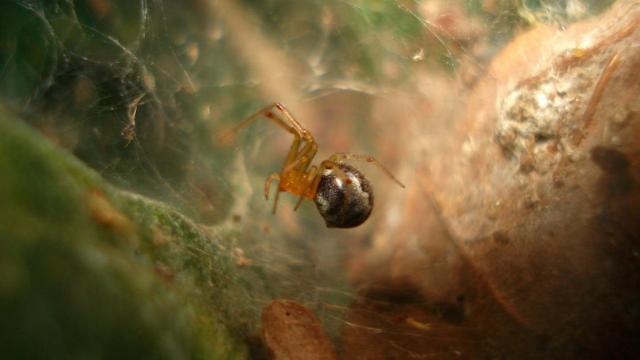Hurricanes could make spider colonies more aggressive over time, according to a new paper. Let’s add “avoiding extra-evil spider colonies” to our list of reasons to fight climate change, please and thanks.
It’s obvious that hurricanes cause damage, but it’s hard to study how that damage might impact the evolution of the animals that survive the storm. Given that some scientific models suggest that climate change and rising sea levels will yield more powerful storms, or at least more environmental damage from storm surges, this is an important area to research.
A team of researchers in Canada and the United States, led by Alexander Little at the University of California, Santa Barbara, studied the behaviour of the communal spider Anelosimus studiosus on North America’s Atlantic coast. A. studiosus lives in colonies over rivers and streams. Some are aggressive, and some are peaceful, according to the paper published today in Nature Ecology and Evolution. Past research has already demonstrated that colonies as a whole can be more aggressive or docile, based on the resources the colony has access to.
Since cyclones can alter habitats, maybe they alter the behaviours of these colonies, too. To study this, the researchers needed to measure the aggressiveness of the colonies and how well they thrived before and after a storm.
That required following along with weather reports and travelling to locations projected to be hit by a hurricane, record the behaviour of a colony, and then return after the storm to record the behaviour again. They also measured control sites to correspond with each storm-struck site. They determined aggressiveness by the number of spiders that responded when they made the spider web vibrate using a small piece of paper and an electric toothbrush.
The observations revealed that after the cyclone, the more aggressive colonies produced more egg sacs and had more baby spiders survive the year, where the opposite seemed to be true in sites that didn’t get hit by a hurricane. The researchers also measured 211 sites across the species range before hurricanes started to hit, and noticed that spider colonies were more aggressive in counties that had been hit by more storms.
Other papers have tied these intense weather events to animal behaviour, but they often rely only on observations after the event and correlations. But this study is “a remarkable example that addresses this knowledge gap; by studying the impacts of tropical cyclones with spatiotemporal replications and control sites, they show that selectivity for more aggressive colonies of Anelosimus studiosus is a robust evolutionary response to cyclone-induced disturbance,” Eric Ameca, a researcher at Beijing Normal University, wrote in a Nature commentary. He thought the study offered an important insight into how certain species adapt to extreme weather.
As to why the spiders got mean, the researchers had a few ideas. Maybe there’s less prey available right after the cyclone, or maybe storm kills some of the mothers and forces the spiders to figure out how to survive with less maternal care, favouring more aggressive individuals.
How does climate change play into all of this? Gizmodo has covered how models show that warming oceans lead to more and more powerful storms. Now, we know that more powerful storms could mean more powerful spiders, in additional to all the other trouble they cause.
This is just one study covering one species, of course. But if past research has already found correlations between storms and evolution among certain species, then this study offers even more convincing evidence. All of this leads me to conclude one thing: After the apocalypse, the arthropods will reign.
